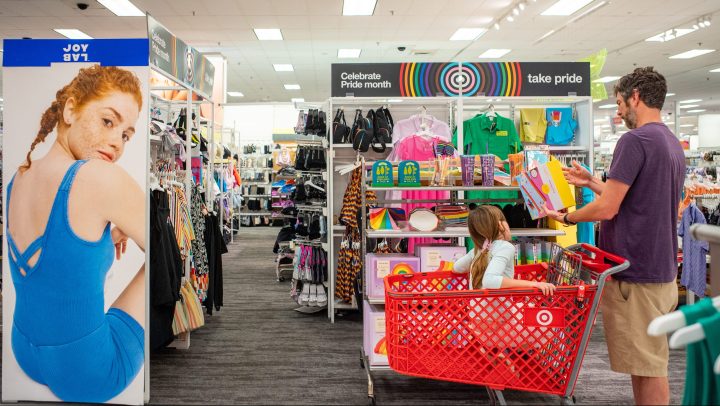
For brands facing transphobic backlash, walking back inclusive campaigns may be “shortsighted”
For brands facing transphobic backlash, walking back inclusive campaigns may be “shortsighted”

For a decade or so, it’s been common practice for big companies to show their support for LGBTQ customers or — depending on how you look at it — chase their dollars and cultivate brand loyalty during Pride Month. But this year has been different. Inclusive marketing campaigns are drawing social media backlash and even boycotts, and some brands appear to be caving to the pressure.
Target pulled certain products from its Pride collection, citing confrontational behavior by shoppers and the need to protect its employees. Bud Light walked back its brief collaboration with a transgender TikTok influencer, but that didn’t stop it from losing its long-held status as America’s best-selling beer. The brand’s parent company, Anheuser-Busch, issued a quasi-apology for simply doing business with a trans person, but that doesn’t seem to have appeased transphobic boycotters. At the same time, it appears to have alienated LGBTQ people and their allies.
“When Kid Rock took out an automatic weapon and shot up a case of beer, you did not see anyone from Anheuser-Busch saying, ‘Hey this isn’t OK,’” said Mark Robertson, who has been watching these events play out from Chicago. He co-owns four LGBTQ bars in the city that used to serve a lot of Anheuser-Busch products until that apologetic statement from the CEO prompted Robertson to cut ties.
“Having a brand that was so enveloped in the hate and not condemning the hate is not something that we would feel comfortable having in our spaces,” he said. “We spent thousands of dollars redoing menus and signage and things like that to completely remove them from the premises.”
For as long as companies have been marketing to LGBTQ people — and they’ve been doing it for decades — those companies have had to choose whether and how to respond to anti-gay backlash.
“I had received hate mail. I was called all kinds of names. We had boycott petitions,” said Tim Bennett, an inclusive marketing expert and the brains behind Subaru’s 15-year campaign advertising its cars to LGBTQ people — emphasis on the “L.”
In the ’90s, Bennett said, the company recognized that its cars were especially popular with lesbians. So it started making ads that spoke directly to those consumers.
“There’s one that said, ‘Different drivers, different roads, one car.’ If you were LGBTQ and you looked a little closer, there was a license plate that said ‘XENA LOVER,’” Bennett said, referencing the ’90s TV series “Xena: Warrior Princess.” “And Xena was a huge icon, particularly with lesbians.”

But this “if you know, you know” style of targeted advertising wasn’t totally covert. Anti-gay groups took notice, and when the hate mail and boycott threats rolled in, Bennett said, Subaru stayed the course.
“What I always used to say at Subaru was, ‘We sell our products to a smart, educated consumer that celebrates diversity.’ And just leave it at that,” Bennett said.
He added that companies can’t please every consumer, and those facing transphobic flak now would do well to remember why they engaged in inclusive marketing to begin with: to sell stuff.
Joanna Schwartz, a professor of marketing at Georgia College & State University who specializes in LGBTQ marketing, said consumers will remember this moment.
“As a company, when this happened, did you stand up for people? Or did you pull back and try to minimize the fact that this is a group that you care about?” Schwartz said.

She said anti-trans activists are emboldened by the “extreme nature of the political environment” around LGBTQ issues right now, and they’re doing a lot of damage to some companies’ bottom lines. Still, Schwartz called pulling back inclusive products and campaigns “shortsighted.” Especially considering that polling finds 1 in 5 Gen Z adults identifies as LGBT.
“When you’re looking at this as a marketplace issue, the young consumers who are coming up are more likely to be out than the population as a whole,” Schwartz said. “And those are the consumers that you want to make sure that you satisfy, right?”
Consumers like Ashley Welch, who’s 26 and lives in Seattle.
“I very, very much care where my dollar is going,” Welch said — and lately they are especially keen to spend with companies that loudly support transgender rights. They see companies walking back trans-inclusive campaigns as capitulating to the demands of a hate movement.
“If it no longer seems profitable for [those companies], they will show me who they really are, which is not an ally of my community,” Welch said.
Welch was never much of a Bud Light drinker to begin with (more of a hard seltzer person) but they said they’ll definitely be spending less money at Target now. They used to feel good about shopping in a store that put inclusive displays front and center and sponsored parades during Pride Month. Now, those shows of support feel superficial.
There’s a lot happening in the world. Through it all, Marketplace is here for you.
You rely on Marketplace to break down the world’s events and tell you how it affects you in a fact-based, approachable way. We rely on your financial support to keep making that possible.
Your donation today powers the independent journalism that you rely on. For just $5/month, you can help sustain Marketplace so we can keep reporting on the things that matter to you.











